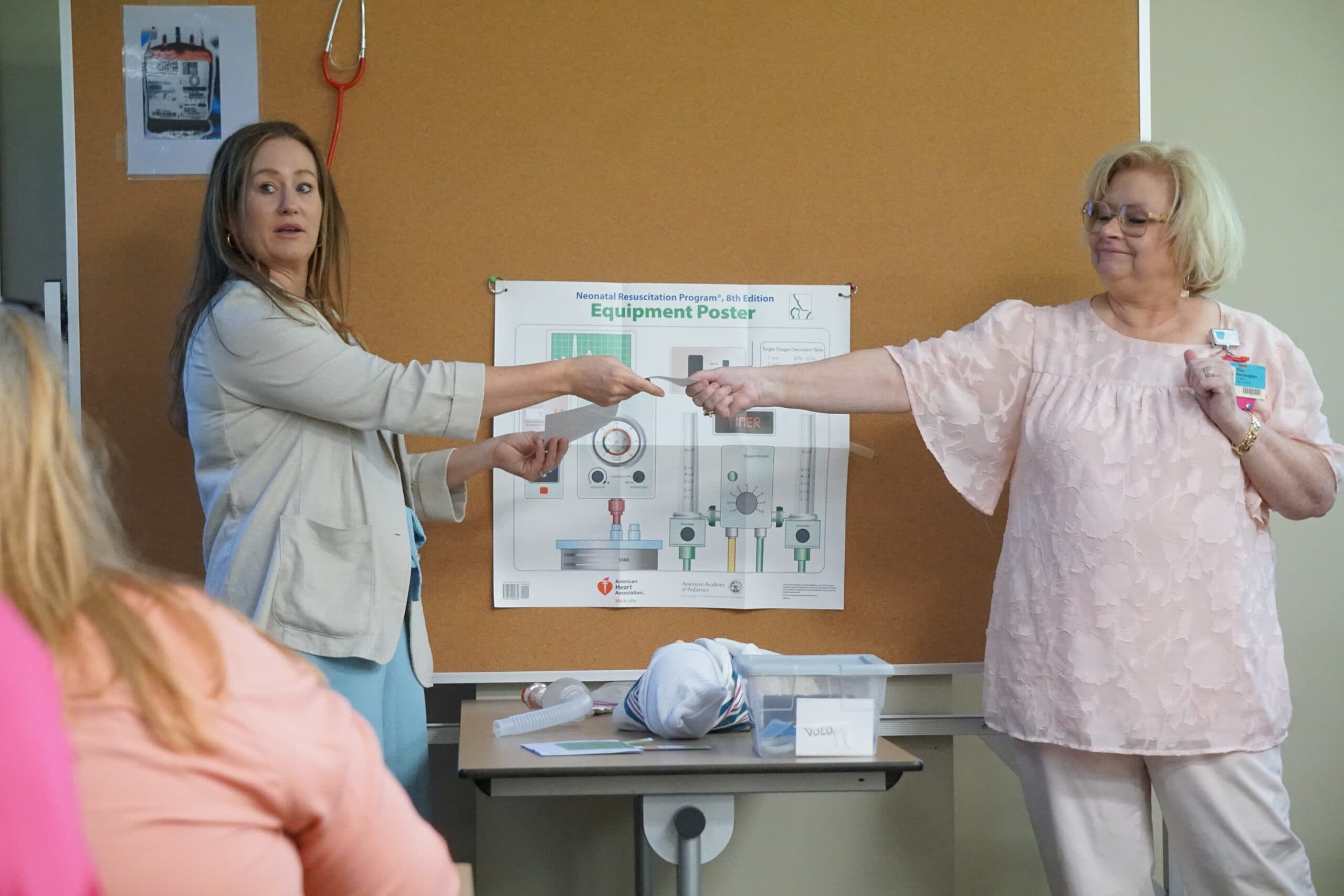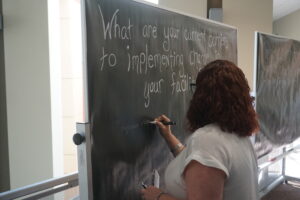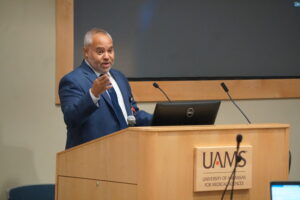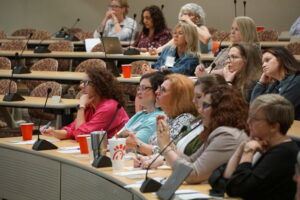View Larger Image

Tina Pennington, MNSc (right), hands a clue to Erin Weeks, BSN, as part of a breakout session demonstrating a newborn emergency "escape room" at the April 24 workshop.
Image by Benjamin Waldrum
Challenges, Opportunities Discussed at UAMS Perinatal Health Workshop
| More than 96 front-line caregivers from hospitals across Arkansas came together in Little Rock to attend an April 24 workshop aimed at improving perinatal care. An additional 24 participants tuned in to the workshop virtually.
The all-day workshop, held on the second floor of the I. Dodd Wilson Education Building on the UAMS Little Rock campus, was a partnership between the University of Arkansas for Medical Sciences (UAMS), the Arkansas Perinatal Quality Collaborative (ARPQC) and the Perinatal Outcomes Workgroup Through Education and Research (POWER), a part of the High-Risk Pregnancy Program at UAMS’s Institute for Digital Health & Innovation.
Joseph Sanford, M.D., director of the Institute for Digital Health & Innovation, opened the meeting by noting that the last year has included challenges and opportunities for maternal health in Arkansas, and expressed optimism for the future.
“The good news is that there is some good news,” Sanford said. “Arkansas has taken this issue seriously for a very long time, but it gives me a lot of hope seeing the opportunistic alignment of everyone, at every facet of the problem, wanting to push boundaries and make meaningful change quickly.”
Sanford cited several recent positive developments that would aid improvements in maternal health, including the formation of the ARPQC in the fall, the creation of the UAMS Institute for Community Health Innovation in March, and grant funding last year for a study in comprehensive postpartum care and the creation of a maternal depression program in March. In February, UAMS hosted a roundtable with Gov. Sarah Huckabee Sanders, Sen. John Boozman and Rep. French Hill to discuss ways of addressing maternal health issues across the state.
Arkansas ranks last in the nation for maternal health outcomes and has the third-highest infant mortality rate. There are only 35 hospitals across the state with active labor units.

Front-line caregivers were asked to answer questions about barriers to perinatal care at their facilities.Benjamin Waldrum
The UAMS-led ARPQC, formed in August, shares evidence-based maternal safety bundles with participating hospitals and provides tools for implementing clinical guidelines. Its first initiative has a goal of reducing primary cesarean deliveries rates at local hospitals. Arkansas ranks 14th in the nation in cesarean deliveries, according to the Centers for Disease Control & Prevention. Cesarean deliveries — also referred to as C-sections — can increase a patient’s risk of infections, blood clots and severe complications in future pregnancies.
“Thirty-four of Arkansas’ 35 birthing hospitals have come together in monthly virtual meetings during the past year to implement changes that improve care for maternity patients. There’s a real collaborative spirit among these teams across the state, which was evident from the enthusiasm for bringing these teams to learn together in one place,” said Jennifer Callaghan-Koru, Ph.D., associate professor of public health and ARPQC director of evaluation and research.
Workshop activities included presentations from national experts on evidence-based labor induction protocols and intermittent auscultation, which is a technique that counts fetal heartbeats during labor.
Breakout sessions provided both lectures and direct participation, including a newborn emergency “escape room” demonstration as a refresher for front-line workers. Other sessions focused on maternal health data and racial disparities in postpartum care, along with a cheat sheet on many warning signs of postpartum complications. There were also large blackboards in the hallway for attendees to share any barriers to implementing change and successes in their quality work journey.
“We were excited to host our spring workshop this year in Little Rock,” said Dawn Brown, BSN, program director for ARPQC and POWER. “Bringing together our delivering hospital and others interested in improving maternal and neonatal health outcomes is always a win, and seeing everyone’s enthusiasm about the work we are doing is inspiring. Providing this opportunity to connect and build relationships is so important as we work to strengthen our collaborative work.”

William “Sam” Greenfield, M.D., MBA, gave an update on the state of maternal health in Arkansas.Benjamin Waldrum
William “Sam” Greenfield, M.D., MBA, medical director of Family Health with the Arkansas Department of Health and professor in the UAMS Department of Obstetrics and Gynecology, gave an update on the state of maternal health in Arkansas. Addressing the front-line workers in the audience directly, he praised their efforts but said there is more work to be done.
“You are the army that will be going out to improve the state of maternal health in Arkansas,” Greenfield said. “This is a phenomenal group, but just know that you are going to have to keep pushing, because the work is needed, and the work is meaningful. We think about all the work that we’re doing to help moms, but you know what? Moms know what’s wrong. This campaign needs to include everybody else, in addition to mothers, because there are things going unrecognized and unheard.”
